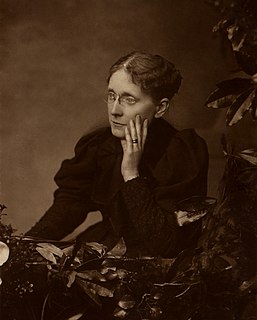A Quote by Samuel Johnson
Nothing is more common than to find men, whose works are now totally neglected, mentioned with praises by their contemporaries as the oracles of their age, and the legislators of science.
Related Quotes
We can reorient science - for example, a kind of medicine much more directed toward the enormous number of women's health problems which are neglected now. But the original givens of this science are the same for men and for women. Women simply have to steal the instrument; they don't have to break it, or try, a priori, to make of it something totally different. Steal it and use it for their own good.
What a singular destiny has been that of this remarkable man!-To be regarded in his own age as a classic, and in ours as a companion! To receive from his contemporaries that full homage which men of genius have in general received only from posterity; to be more intimately known to posterity than other men are known to their contemporaries!
Science and religion...are friends, not foes, in the common quest for knowledge. Some people may find this surprising, for there's a feeling throughout our society that religious belief is outmoded, or downright impossible, in a scientific age. I don't agree. In fact, I'd go so far as to say that if people in this so-called 'scientific age' knew a bit more about science than many of them actually do, they'd find it easier to share my views.
And if we now cast our eyes over the nations of the earth, we shall find that, instead of possessing the pure religion of the Gospel, they may be divided either into infidels, who deny the truth; or politicians who make religion a stalking horse for their ambition; or professors, who walk in the trammels of orthodoxy, and are more attentive to traditions and ordinances of men than to the oracles of truth.
Yet as I cast my eye over the whole course of science I behold instances of false science, even more pretentious and popular than that of Einstein gradually fading into ineptitude under the searchlight; and I have no doubt that there will arise a new generation who will look with a wonder and amazement, deeper than now accompany Einstein, at our galaxy of thinkers, men of science, popular critics, authoritative professors and witty dramatists, who have been satisfied to waive their common sense in view of Einstein's absurdities.
The religious geniuses of all ages have been distinguished by this kind of religious feeling, which knows no dogma and no God conceived in man's image; so that there can be no church whose central teachings are based on it. Hence it is precisely among the heretics of every age that we find men who were filled with this highest kind of religious feeling and were in many cases regarded by their contemporaries as atheists, sometimes also as saints. Looked at in this light, men like Democritus, Francis of Assisi, and Spinoza are closely akin to one another.
If a man is endowed with a noble and courageous soul, if he is painstaking, proud, ambitious, without meanness, of a profound a deep-seated intelligence, I dare assert that he lacks nothing to be neglected by the great and men in high office, who fear, more than other men, those whom they cannot dominate.
It's actually quite common for presidents to believe that future generations will render a verdict on their presidencies that is more lasting or definitive than the judgments of their contemporaries. The reason is that although history is certainly "an argument without end" - we're still debating many age-old questions - time does help settle others.
Thus science strips off, one after the other, the more or less gross materialisations by which we endeavour to form an objective image of the soul, till men of science, speculating, in their non-scientific intervals, like other men on what science may possibly lead to, have prophesied that we shall soon have to confess that the soul is nothing else than a function of certain complex material systems.





































